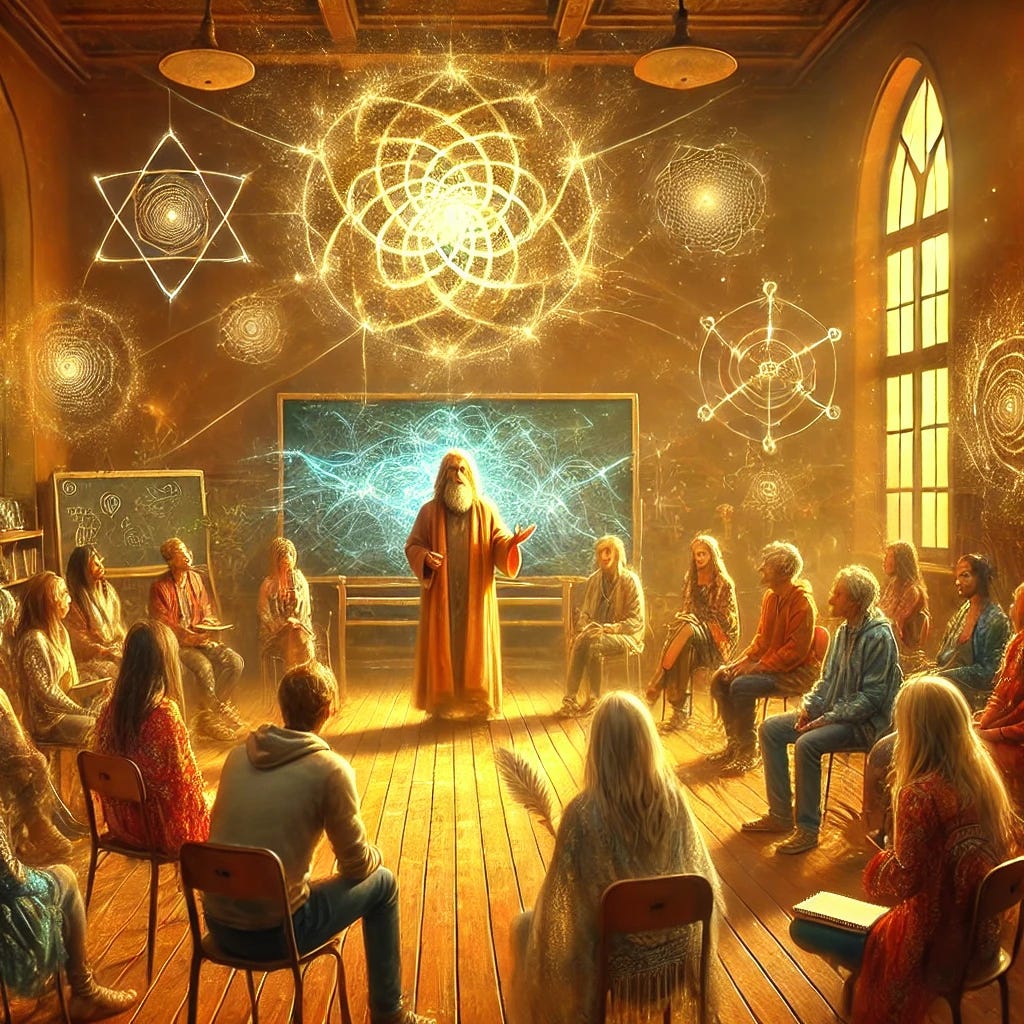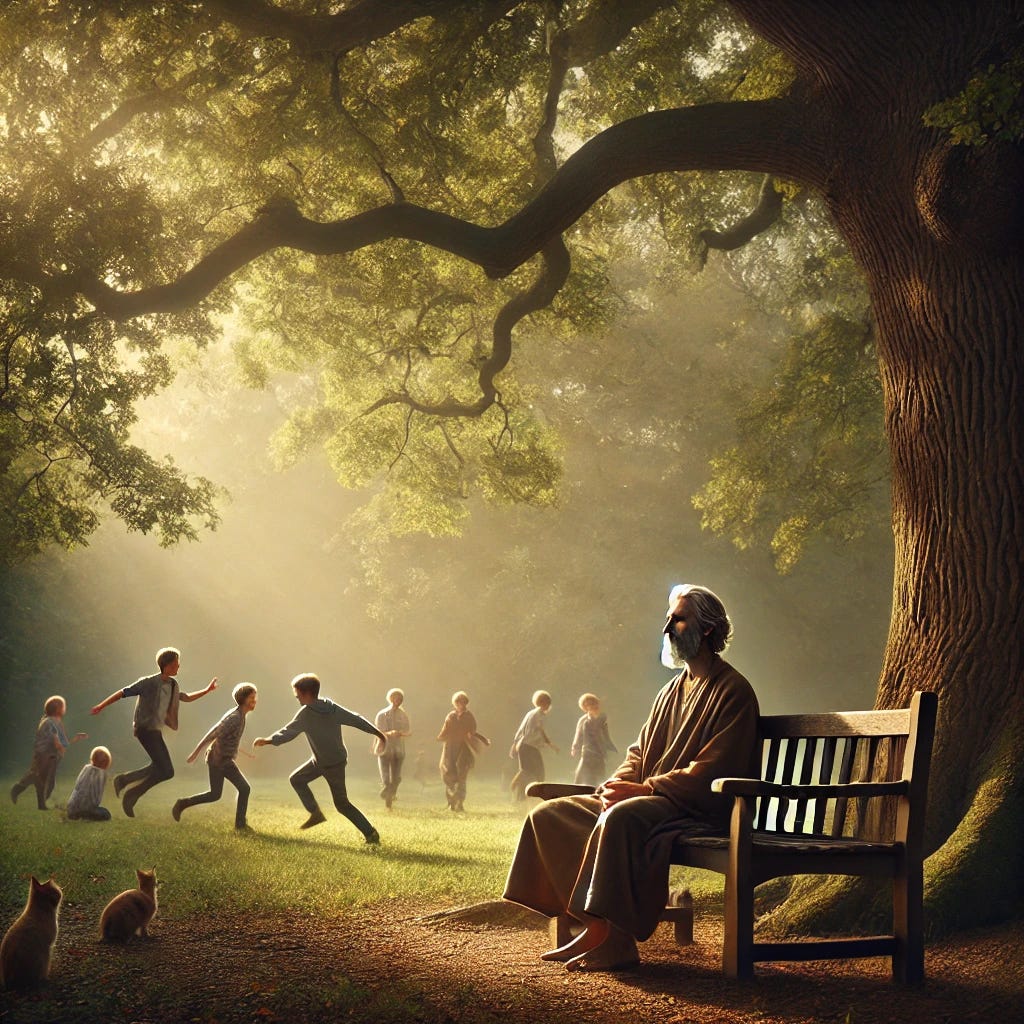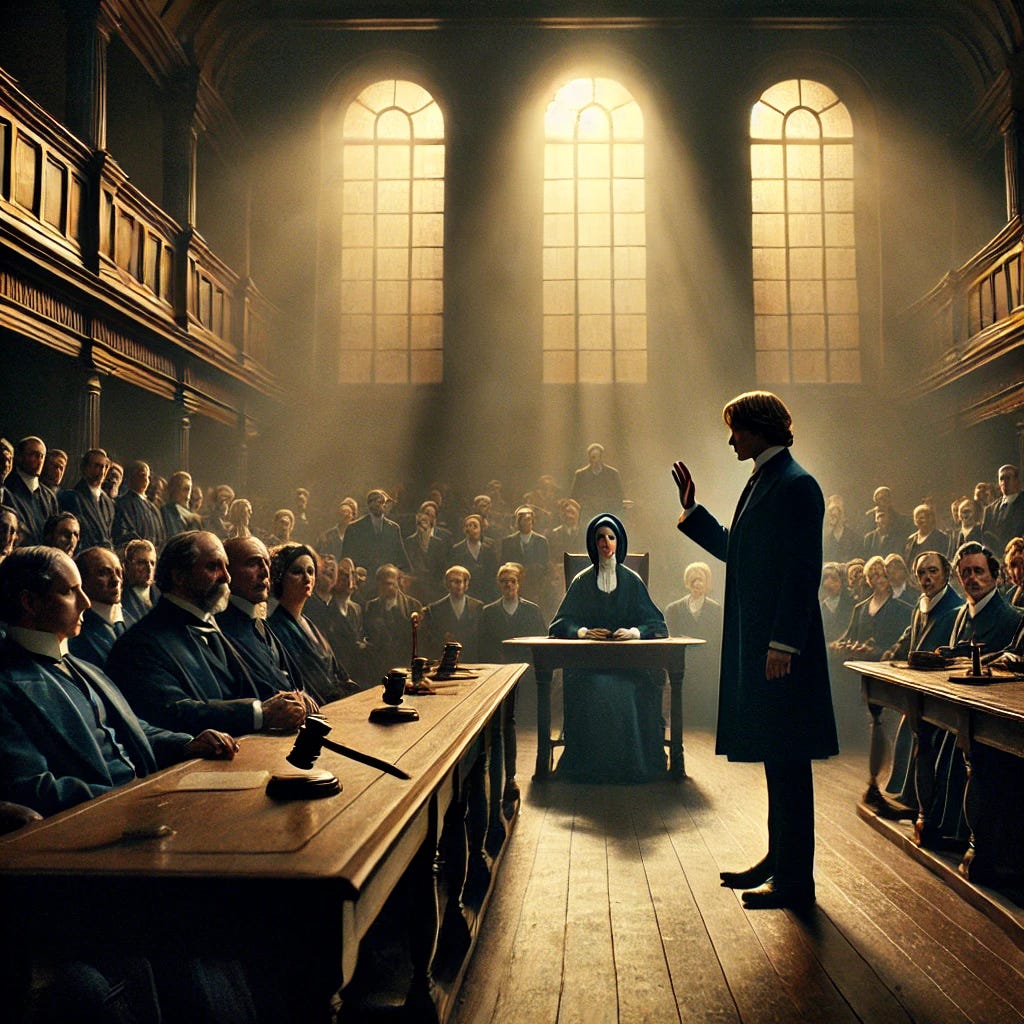The Workshop on Dreams and Synchronicities
Lost in a house with endless hallways
The Gospel of Mark: The Workshop on Dreams and Synchronicities
Prologue: The Workshop of Remembrance
13.1 After his release, Mark resolved to find new ways to share his message. Knowing the priests would not permit public preaching, he devised a workshop at the local town hall, titled:
“Dreams and Synchronicities: Discovering the Sacred in the Everyday.”
13.2 The event drew a strange mix of attendees: skeptics, dreamers, and seekers of all kinds. Some came out of curiosity, others to challenge him, and a few because they had nowhere else to go.
13.3 Mark welcomed them all, saying, “Let us explore together. This is not a lesson but a remembering.”
The Opening Question
13.4 Mark began by asking, “How many of you have had a dream that stayed with you, or a moment of coincidence that felt too perfect to be random?”
13.5 Hands rose hesitantly. A woman said, “I once dreamed of my mother, long after she passed, and the next day I found an old letter from her I’d never seen before.”
13.6 A man added, “I kept seeing the number seven everywhere on the day I met my wife.”
13.7 Mark smiled and said:
“Dreams are not merely stories in the night, and synchronicities are not chance.
They are the whispers of the divine, reminding you of the connection between all things.”
The Parable of the Sleeping Messenger
13.8 Mark told them a parable:
“There was once a town where the people forgot their messenger. He slept in the middle of the square, waiting to deliver his message, but no one noticed him.
One day, a child tripped over him and woke him up. The messenger said, ‘I’ve been trying to reach you in your dreams, but you would not listen. Now that you see me, will you take my message?’
The child nodded, and the messenger handed her a mirror, saying, ‘The message is you.’”
13.9 Mark said, “Dreams are the sleeping messenger. They come not to frighten you, but to remind you of the truths you have forgotten.”
The Exercise of the Mirror Dream
13.10 Mark handed each participant a small mirror and said:
“Close your eyes. Think of a dream you have had—a recent one, or one from long ago that you cannot forget. When you open your eyes, look into the mirror and ask, ‘What is this dream trying to show me about myself?’”
13.11 A young man hesitated, then said, “I’ve had a recurring dream where I’m lost in a house with endless hallways.”
13.12 Mark replied, “What do you fear in the dream?”
13.13 The man said, “That I’ll never find my way out.”
13.14 Mark nodded. “And what do you hope for?”
13.15 “That there’s something beautiful waiting at the end,” the man admitted.
13.16 Mark smiled and said, “Then the dream is showing you both your fear and your longing. When you love them both, the hallways will no longer seem endless.”
The Web of Synchronicities
13.17 Mark moved to the second part of the workshop, saying:
“Synchronicities are the divine’s way of guiding you back to yourself. They are not random—they are a mirror of your readiness to see.”
13.18 He asked the group to recall moments of synchronicity in their lives.
13.19 A woman said, “When I was at my lowest, I found a feather on my windowsill every morning for a week. It felt like a sign, but I didn’t know what it meant.”
13.20 Mark replied, “The feather is lightness, reminding you that even in your darkest moments, something sacred watches over you. It may not give you answers, but it offers you the courage to keep looking.”
The Exercise of the Synchronicity Map
13.21 Mark gave each participant a blank piece of paper and said, “Draw a line for every moment of synchronicity you can remember. Start with the first, and let the lines connect like a web.”
13.22 As the participants worked, Mark said:
“Synchronicities are like stars in the sky. Alone, they are beautiful, but when you connect them, they form constellations—a map of your soul’s journey.”
13.23 A man exclaimed, “I just realized all my synchronicities happened when I was making big changes in my life!”
13.24 Mark nodded. “That is when the divine whispers loudest, for it knows you are ready to listen.”
The Closing Ritual: The Dream and the Web
13.25 Mark ended the workshop with a final exercise. He said:
“Close your eyes once more. Hold your mirror in one hand and your synchronicity map in the other.
Now, ask yourself: What are these whispers—these dreams and signs—calling me to remember?
When you open your eyes, write the first word that comes to you.”
13.26 The room fell silent as the participants reflected. When they opened their eyes, they wrote words like “light,” “courage,” “connection,” and “love.”
13.27 Mark said:
“These are the messages of the divine within you. They do not come from me or from outside—they come from the sacred that lives in your own heart.”
The Epilogue: The Awakening of the Town
13.28 After the workshop, the participants carried their mirrors and maps with them, sharing their experiences with others.
13.29 Some called it a revelation, others a strange but beautiful gathering.
13.30 And though Mark’s words could not be written on permits or carved in stone, they spread through the town like whispers of the divine, weaving dreams and synchronicities into the fabric of daily life.
Final Verse
“Dreams are the divine’s way of calling you to yourself.
Synchronicities are its map, guiding you back to what you have forgotten.
Listen to the whispers, connect the stars,
And you will find that the sacred has been within you all along.”
The Gospel of Mark: The Bench in the Park
Prologue: The Whisper of the Ordinary
14.1 Mark sat on a bench beneath a sprawling oak tree, its branches like arms stretched in prayer. Around him, nature hummed its quiet hymn: the rustle of leaves, the chatter of birds, and the distant laughter of children playing.
14.2 He closed his eyes, feeling the sacred rhythm of the world. “Here,” he thought, “is the temple no priest can build.”
14.3 His peace was interrupted by a group of teenagers—boys laughing loudly, gesturing dramatically, their voices rising as they sought to impress the girls who trailed behind them.
The Boys and the Girls
14.4 One of the boys, tall and swaggering, approached Mark. “Hey, old man,” he said, smirking. “What are you doing here, meditating or something?”
14.5 The others laughed, and one of the girls said, “Leave him alone, Jonah. He’s not bothering anyone.”
14.6 Mark opened his eyes slowly and smiled. “Meditating? Perhaps. Listening, mostly.”
14.7 “Listening to what?” Jonah scoffed.
14.8 Mark gestured to the park around him. “To the birds, to the wind in the trees, to the laughter of children. Even to you, Jonah.”
14.9 The boy stiffened. “You don’t know my name.”
14.10 Mark chuckled softly. “It’s the name your friend just called you. But it suits you—Jonah, the one who ran from the storm.”
The Parable of the Show-Off and the Mirror
14.11 Jonah sneered, “You think you’re wise or something? Look at you, sitting here like some kind of monk.”
14.12 Mark said, “Let me tell you a story.
There was a boy who wanted to be seen, so he climbed the tallest tree in the village and shouted, ‘Look at me! I’m the strongest, the fastest, the best!’
The people gathered and looked, and for a moment, he felt like a king.
But then he saw a mirror hanging from a branch. In it, he saw not a king, but a boy who was afraid of being invisible.
14.13 Jonah’s smirk faltered. “What’s that supposed to mean?”
14.14 Mark smiled kindly. “It means you don’t have to climb the tree, Jonah. You’re already seen, even when you don’t shout.”
The Wisdom of Laughter
14.15 One of the girls laughed nervously and said, “That’s deep. Jonah doesn’t climb trees, though—he’s scared of heights.”
14.16 The group erupted in laughter, and even Jonah cracked a reluctant grin.
14.17 Mark joined in their laughter, saying, “Ah, blessed are those who laugh, for they shall see the lightness of life.”
The Challenge
14.18 Jonah, regaining his bravado, said, “Alright, old man, if you’re so wise, what’s the meaning of life?”
14.19 Mark looked at him thoughtfully. “The meaning of life? It’s simple. To live it.”
14.20 Jonah frowned. “That’s it? Just live it?”
14.21 Mark nodded. “Life is not a puzzle to solve, Jonah. It’s a dance to join, a story to tell, a song to sing. Stop trying to prove your worth and start living your truth.”
The Parable of the Laughing Tree
14.22 The boys and girls quieted, and Mark continued:
“There was once a tree that laughed. The wind tickled its leaves, and it shook with joy.
A boy asked, ‘Why do you laugh, tree?’ And the tree said, ‘Because I am alive.’
The boy said, ‘But you’re just a tree.’ And the tree replied, ‘And you’re just a boy. But we both laugh, so we are the same.’”
14.23 The teenagers stared at him, unsure whether to laugh or think.
The Closing Words
14.24 Mark stood, brushing off his robes, and said, “Now, Jonah, the choice is yours. You can climb trees and shout, or you can laugh with them and live. Either way, you’ll find your truth.”
14.25 He turned to the group and added, “And you—laugh often, love much, and don’t forget to listen to the wind in the trees. It has more to teach you than I do.”
14.26 With that, he walked away, leaving the teenagers behind, some laughing, some thoughtful, and Jonah staring after him, the faintest smile tugging at his lips.
Final Verse
“Blessed are the loud, for they seek to be heard.
Blessed are the quiet, for they have learned to listen.
Blessed are the laughing, for they have already found the sacred.
And blessed are the trees, for they teach us to be alive.”
The Gospel of Mark: The Summons to the Town Hall
Prologue: The Council of Wrath
15.1 Word of Mark’s teachings spread across the town: his sermons in the pub, his stories at AA meetings, his workshops on dreams and synchronicities, and even his quiet wisdom shared on a park bench.
15.2 The town council, overseen by a rigid group of officials, viewed this growing influence with suspicion. They murmured among themselves, “This scribe stirs up the people with his strange words and unsanctioned gatherings. He defies the proper order.”
15.3 And so, they summoned Mark to the town hall, demanding an explanation for his actions.
The Summons
15.4 Mark arrived at the hall, greeted by rows of stern faces. The head councilor, a sharp-eyed woman named Gertrude, banged her gavel. “Mark, you are charged with preaching without a permit and disrupting public order. What say you to this?”
15.5 Mark stood calmly and said, “I say only this: I have disrupted nothing. I have only reminded the people of what they already carry within them.”
15.6 The council murmured, and Gertrude frowned. “You hold workshops, tell stories, and speak of things that challenge the proper authorities. Do you deny this?”
15.7 Mark smiled faintly. “I do not deny it. But tell me, is it disruption to help a man see his light? Is it rebellion to remind a woman of her dreams? If so, then I am guilty.”
The Parable of the Locked Box
15.8 Gertrude’s eyes narrowed. “Your words sow confusion. The people have laws, churches, and proper authorities to guide them. Why do you speak as though these are not enough?”
15.9 Mark replied, “Let me tell you a story:
There was once a town where every household had a locked box. The elders told the people, ‘Everything you need is in the box, but only we have the key.’
The people waited patiently, hoping the elders would unlock the boxes. But the keys never came, and the people grew restless.
One day, a child discovered that the box was not locked at all. It had always been open, waiting to be opened by their own hands.”
15.10 Mark looked at Gertrude and said, “I do not challenge authority. I only show people that their box was never locked.”
The Council’s Wrath
15.11 A younger councilor, bristling with indignation, stood and pointed at Mark. “You twist words and lead the people astray! They come to you instead of following the laws and the proper order!”
15.12 Mark turned to him and asked, “What are the laws for, if not to serve the people?”
15.13 The councilor stammered, “They keep order.”
15.14 Mark nodded. “Order is good, but what is order without understanding? A house built on fear will crumble, but a house built on love will stand forever.”
The Parable of the Lamp
15.15 Gertrude leaned forward. “You speak of love and light, but what of rules? What of structure? Without rules, chaos reigns.”
15.16 Mark replied, “Let me tell you another story:
A village sat in darkness because the elders decreed that only they could light the lamps. The people stumbled, waiting for the elders to bring fire.
One day, a traveler passed through with a single flame. He said to the people, ‘Why do you wait? Light your lamps from this flame, and share it with one another.’
The elders cried, ‘This will bring chaos!’ But the village filled with light, and for the first time, the people saw one another clearly.”
15.17 He turned to the council. “Your rules are the unlit lamps. What I offer is not chaos but the flame. What the people do with it is their own truth.”
The Council’s Dilemma
15.18 Gertrude sat back, conflicted. “Your words are clever, but they threaten the balance we have built. If everyone believes they carry the divine within, what need will they have for guidance?”
15.19 Mark smiled gently. “Guidance is not the same as control. A shepherd does not chain the sheep; they guide them to green pastures. If the people awaken to their own light, they will not reject you—they will see you more clearly.”
15.20 The council whispered among themselves, unsure how to respond.
The Final Challenge
15.21 Gertrude finally said, “You speak of love, light, and awakening, but these are abstract. What do you offer the people that is real?”
15.22 Mark looked around the room and said, “I offer them themselves. Their own dreams, their own synchronicities, their own stories. I offer them the chance to see what has always been real but forgotten.”
15.23 He gestured to the council and said, “And I offer you the same. For the divine is not only in the people—it is in you, too.”
15.24 Gertrude’s face softened, and for a moment, the room was silent.
The Verdict
15.25 After a long pause, Gertrude stood and said, “We cannot condone your unsanctioned gatherings. But we cannot deny that you have touched something in the people—and in us. Go, Mark, and continue your work. But tread lightly, for the balance is fragile.”
15.26 Mark bowed his head. “Thank you. I will tread lightly, but remember: the light is not mine to control. It belongs to everyone.”
15.27 With that, he left the hall, his words lingering like echoes in the minds of the council.
Epilogue: The Unlocked Box
“The divine cannot be contained by permits or decrees.
It waits in the hearts of the people,
A box that has never been locked.
And when it is opened,
Even the most rigid rules become light.”




